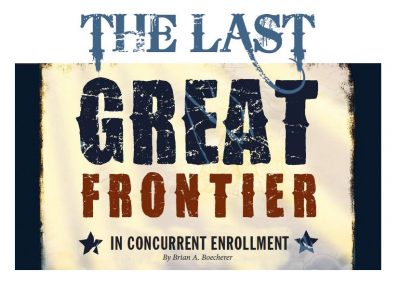By Carissa Rutkauskas and Kathrine Grant
The 2020 New England Association of Concurrent Enrollment Partnerships (NEACEP) was to be held at the University of Rhode Island on May 29, with the theme of Barriers & Breakthroughs in Early College Programming; however the event was postponed due to COVID-19. Carissa Rutkauskas and Kathrine Grant’s presentation, CE in NE: History, Facts, and Stats to Communicate a Stronger, More Unified Future will have to wait until it is safe for people to once again travel, gather in groups, and appreciate the freedoms associated with a pre-pandemic lifestyle. While we will not be presenting at NEACEP this spring, we would like to share a glimpse of what we have been working on here.
The presentation is an overview of the challenges and barriers created by a lack of centralized, key programmatic features across the field and within specific programs—including marketing, data, and theory behind Concurrent Enrollment (CE)—and offers suggestions of for a centralized ideological strategy, organizing, professionalization, and strategic marketing as part of the solution.
Centralized ideological strategy. CE programs vary vastly by region, state, and even within states. A sample of differentiating variables include, but are not limited to: program name and terminology used, who teaches, where courses are taught, cost of program, matriculation status of the students, and programs hosted by two-year technical versus four-year institutions of higher education (IHE). The University of Connecticut’s original concurrent enrollment program, the High School Co-operative Program for Superior Students, was established in 1955 and laid the groundwork for its continuously operating program. In 1997, the National Association of Concurrent Enrollment Programs (NACEP) became the first, and to date, the only national accreditation body of its type. They, and organizations such as the College in High School Alliance, the Education Commission of the States, and independent researchers, have helped create a strong framework and standards for the idea of high school students taking college courses.
Essential to this agenda is an agreed upon, standard terminology. The U.S. Department of Education defines dual enrollment (DE) as students enroll in postsecondary coursework while also enrolled in high school.* NACEP defines CE as the subset of dual enrollment courses taught by college-approved high schools. Yet, not all programs or states employ the same language to describe the same process of accelerating secondary learning: a concurrent program in one state may be considered a dual enrollment in another. These seemingly straightforward definitions, unfortunately, have not established a precedent on name standardization at the state-level; the issue of naming and terminology is and are further exasperated with the use of dual credit and names and definitions unique to states and individual programs.
Equally essential is determining what CE is not. Standardized tests, such as the College Level Exam Placement (CLEP), Advanced Placement (AP), and International Baccalaureate (IB) can be categorized as Prior Learning Assessments (PLAs), where credit is earned outside the classroom, or based off a single assessment, usually in the form of an exam. These and other PLAs are often mistakenly categorized with CE credit, for political, economic, or reasons of unfamiliarity with the differences. Clearly defining and communicating what CE is, including the parameters of instruction, location, and testing, is paramount to its continued success.
Organizing. NACEP, NEACEP (and other state NACEP chapters) have done amazing work in creating a more centralized and unified approach, but states without a strong statewide CE policy or legislation are often left fragmented. In Connecticut, for example, the brief amount of the State legislation on CE is vague at best and does not assign a name to high school students enrolled in college courses (regardless of where they are taking their course—at their high school or on their a college campus). Even as the home of the first concurrent enrollment program in the country, our State guidance is not well-defined, diminishes the strength of CE programs.
Of the 36 degree-granting undergraduate IHEs in the State, nearly all offer some type of college credit program or opportunity for high school students – whether it be CE, DE, PLAs, or another model. Unfortunately there is currently no accurate database or combination of internet search terms that would produce a complete list of these courses. To find all of the programs in Connecticut, you would have to combine a series of search terms—and you still might miss a program or two. States such as Utah and Vermont have comprehensive statewide policies in place and assign a specific and clear name to their programs. The lack of common language between and among states not only further obscures the prospect of comprehensive research or the likelihood students being able to maximize earning college credit while in high school—it also provides utter confusion. For example, Utah uses the term concurrent enrollment and Vermont’s choice is dual enrollment in state policy for programs in which a secondary school student can take a postsecondary course at the high school or IHE with IHE oversight. At UConn ECE, we would define this as a concurrent enrollment program—even though our program is only for students who take postsecondary courses at their high school.
The National Center for Education Statistics (NCES) also does not completely accurately represent these type of programs. Although UConn ECE is the oldest and one of the largest programs in the country of its type, its CE impact is often overlooked. UConn ECE students are not matriculating college students, but rather non-degree students. This means they have the option of transferring their credits to a degree-seeking instruction (non-matriculated means that just because they are a part of UConn ECE and are taking UConn courses, they are not pursuing a degree at the University). UConn ECE is one of the nation’s largest programs, serving approximately 13,500 students annually, but these figures are often captured only at the institutional level and are missing from NCES databases or at the state level. Without organizing, and the consistency in language that comes with, the impact of programs like UConn ECE—from providing access to higher education to the many financial benefits for students—can be completely overlooked.
Professionalization. The sharing and dissemination of specialized knowledge and information in relation to CE programs through professional organizations not only safeguards and refines best practices but provides an opportunity for mutual enrichment and advancement. Organizations like NACEP and NEACEP do just this: from conferences to reaccreditation, they help to ensure quality in programs and continual improvement within the field. These organizations not only help maintain a sense of norms and offer a centralized ideological strategy through their research, advocacy, engagement, and community and comradery through networking and volunteering—they also often are involved in accreditation based on a shared set of standards.
Also key to communicating and challenging new studies, theories, and practices is a peer reviewed academic journal. The CE discipline is fortunate to have a small, but growing, number of organizations and researchers sharing this common purpose; but, the volume and support of research in CE is much less established from than other areas. Those involved with community colleges, for example, can be a member of the American Association of Community Colleges, as well as dozens of niche councils, alliances, and associations, with focus on topics such a specific demographic or geography. Institutional accreditation, at least in California, is conducted at the Accrediting Commission for Community and Junior Colleges (ACCJC), while institutions in the rest of the county fall under the auspices of regional accreditations who also serve 4-year institutions. Research is collected in publications that are independent and unbiased from the accreditor in peer-reviewed journals such as Community College Review and Community College Journal of Research and Practice.
To consider the impact of just one organization, take the discipline of English: English Language Arts educators across the pre-k-20 continuum can be a part of the National Council of Teachers of English (NCTE), which is an overarching organization that supports the advancement of the field. This organization hosts an annual convention with specific strands for members with diverse interests. It also houses several academic journals (such as English Journal and College Composition and Communication), advocates for the field at local and national levels, and supports these efforts with coordinated research. NCTE also supports state affiliates, which mirror the national organization, and offers assemblies and groups that allow for specification and continued learning within a certain domain. These many, but unified, aspects of NCTE work in conjunction with one another to provide a coordinated, rich, and diverse engagement and learning network that moves the discipline forward.
CE is making strides in the area of a scholarly periodical with the much anticipated Concurrent Enrollment Review, a partnership among Syracuse University’s Project Advance, Boise State University Concurrent Enrollment Program, and UConn ECE (for more information, see The Last Great Frontier). The goal of this journal is to provide a specific coordinating body to solicit, distribute, warehouse, and support continued research into concurrent enrollment; this effort helps to enhance the continual process of legitimizing and professionalizing the field. CE has a national organization and national conferences. There are regional organizations to support the specific needs of areas within the country. Programs and organizing bodies have made coordinated efforts to advocate for the field, both inside and outside of the political arena. But these efforts do not reflect the full capacity of the field to provide professional development and enrichment opportunities for programs, create and distribute research on the impacts of CE, or advocate for programs and the experiences they provide for students.
Strategic marketing. Organizations like the College Board’s Advanced Placement (AP) and International Baccalaureate’s Diploma Programme (IB) are common household terms, but how many of you were aware of AP tests before you or your student went to high school? And how many were aware of concurrent enrollment opportunities? We would wager that it is a lot less of you in the second group. AP and IB have centralized and strategized their marketing campaigns—across the years and different educational contexts—to move their programs forward. Students know about AP tests (and about SATs and ACTs) and how important they are for secondary and postsecondary opportunities—yet, the impact of concurrent enrollment (which we would argue is greater since it provides an experience more analogous to post-secondary study as compared to a singular test) is so significantly less known.
To return to the many programs in Connecticut that use many names to communicate CE (or DE…or dual credit), the majority of marketing is either done from an IHE program to a high school, or solely the burden of an overworked high school staff. UConn ECE has made efforts to extend this marketing to younger students (such as through our partnership with the Connecticut Parent/ Teachers Association [CT PTA]) to provide students with more, and earlier, information about their secondary academic options. However, these efforts are local to our program and are not aligned with other programs within the state or with regional or national bodies. Two programs through the State of Connecticut’s Community College system, College Career Pathways (CCP), a national program funded through the Carl B. Perkins Career and Technical Improvement Act of 2006, and High School Partnerships Programs (HSPP), are somewhat more organized in presenting these options to students and families. Fortunately, some states with more developed policy do mandate early marketing coordinating these efforts. Centralized marketing, especially on the national level, would provide programs with a structure to continually extend the opportunities they provide to students and help to ensure that more students are aware—and able—to take advantage of CE opportunities.
In closing, coordinating marketing, organizing, and creating and participating in professional organization and activities across state and national levels can help establish a centralized ideological strategy that would help to extend and deepen the mission of concurrent enrollment. A programmatic unity would benefit individuals programs, it makes the experiences provided by concurrent enrollment more accessible and richer for the students and schools we serve. Enhancing, deepening, and extending learning for students is not just CE’s laudable pursuit: it is imperative work to prepare students for a complex, multifaceted, and ever-changing future. Sharing this in a unified and coordinated manner only extends our work.

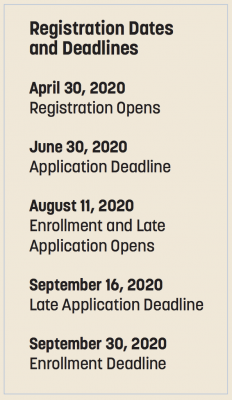




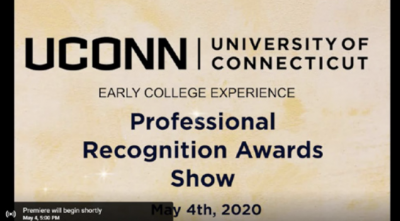
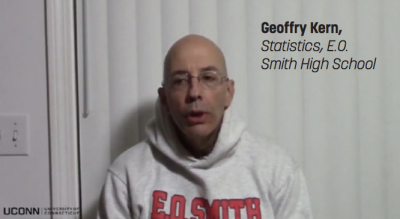
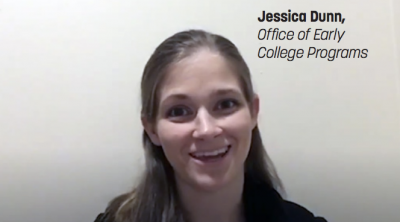
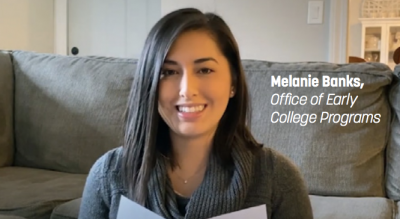
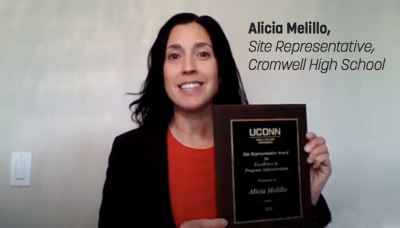
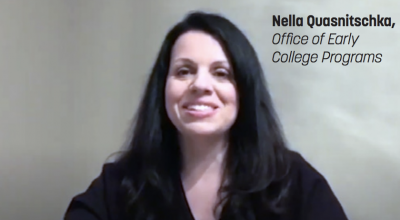
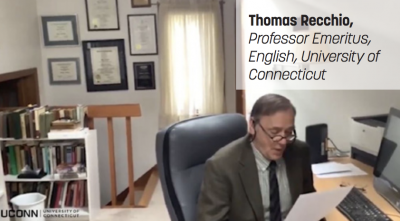


 In 2014, a group of staff from the
In 2014, a group of staff from the  Generation College students. We are looking forward to another year with her on our team and all the
Generation College students. We are looking forward to another year with her on our team and all the
 UConn ECE New Instructor Orientation, which is usually in June, was postponed to August 21st
UConn ECE New Instructor Orientation, which is usually in June, was postponed to August 21st